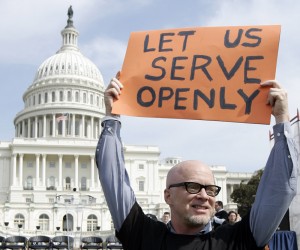The latest twist in the haphazard legal commotion that surrounds gays in the military just got more confusing and, if at all possible, even more ridiculous. Yes, it’s official;

the seventeen year-old “Don’t Ask, Don’t Tell” policy, which upholds the privacy of a service member’s sexual orientation by prohibiting the military from requesting that information but establishes a ban on gays, lesbians, or bisexuals serving openly, is back. However, there is a stipulation attached.
According to a new guideline set in motion, “until further notice” by the Pentagon, discharge of a gay service member who violates the policy must be evaluated by five senior Defense Department military officials. After review by the military officials, the service secretary pertinent to the case—either the Secretary of the Army, Navy or Air Force—must consult with both the Pentagon’s legal counsel, Jeh C. Johnson, and the undersecretary for personnel, Clifford L. Stanley, before a final conclusive determination can be made regarding the discharge.
The change in the policy comes after several deliberations, legal overturns, and national upset. On Sept. 9, Federal District Court judge Virginia A. Phillips declared “Don’t Ask, Don’t Tell” unconstitutional. Phillips issued an injunction nearly a month later, instructing the military to stop enforcement of the law because it infringed upon privacy, free speech, and equal protection. On Oct. 15, the Pentagon gave the military the go-ahead to accept openly gay applicants. The following Wednesday, after an urgent request from the government, a three-judge panel of the U.S. Court of Appeals for the Ninth Circuit federal appeals court allowed the Pentagon to continue temporarily imposing the law.
Amid all the controverted court rulings, gay soldiers, such as Lt. Dan Choi, who had been previously discharged under “Don’t Ask, Don’t Tell,” are now returning to reenlist. However, the ambiguous legal conundrum the newly polished policy finds itself in surrounded by is proving problematic and challenging with what actions to take with the cases. “There’s no reason for the Department of Defense to create such turbulence,” Elaine Donnelly, executive director of the Center for Military Readiness said.
Like Donnelly, several people have grappled with the notion of the new policy addition being either a benefit or cost. Although the Log Cabin Republicans, a gay rights organization, called the new policy addition “a step in the right direction,” Donnelly proceeded to target the forthcoming election for an abrupt change of pace. “There’s only one possibility behind this: presidential politics. The election is two weeks away, and the president is trying to curry favor with his [gay and lesbian voting] base.” (Associated Press)
Either way, what can be agreed upon is the fact that the policy change does not serve as a solution for the issue of gays in the military. So, as of now, it looks like the brief revolutionary court decision of allowing openly gay recruits to be accepted into the military will be held up. Whether it will prove to shape into a historic moment or another frustrating setback remains to be seen.







